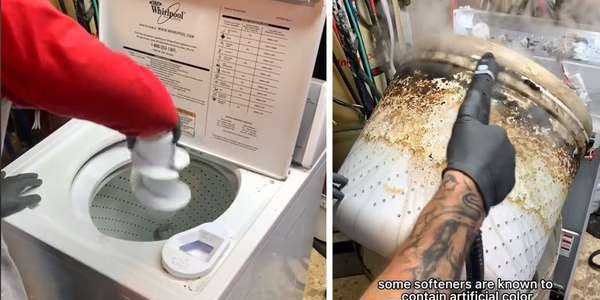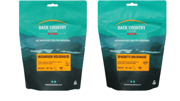This laundry product is a recipe for disaster according to this repairman
By
Danielle F.
- Replies 11
Laundry day is a staple of domestic life, with technology making this menial task easier.
However, convenience often comes with hidden costs.
A recent revelation has caused many to rethink using a common laundry product, as it can potentially cost our health and the environment.
The Unseen Hazards in Your Laundry Room
In a video making the rounds on social media, repairman and online content creator Derrick highlighted the less-talked-about side of fabric softeners and dryer sheets.
As he dismantled a washing machine clogged with residue, Derrick explained the buildup resulted from these seemingly harmless laundry aids.
However, the issues continue beyond your appliance's longevity.
Derrick points out that many of these products contain glutaral, a chemical that can provoke asthma attacks and skin allergies.
Moreover, D&C Violet 2—a dye commonly found in fabric softeners—is linked to cancer and can pose a threat to marine life due to its toxicity.
The Vinegar Solution
Derrick advises skipping chemical-laden products and adding a couple of tablespoons of distilled white vinegar to your wash.
This simple switch can leave your clothes feeling soft and smelling fresh, minus the adverse effects on your health and the environment.
The Benefits of Going Green
The shift towards sustainable cleaning practices is about more than personal health—it's a step towards environmental stewardship.
Many household cleaning products contain complex chemicals that can be harmful.
By choosing safer alternatives like vinegar, you're protecting your health, reducing waste, and saving money.
The aforementioned D&C Violet 2 are from petroleum or coal tar—both byproducts of non-renewable energy sources.
Its carcinogenic potential has landed it on watch lists for various skincare and cosmetic products.
By avoiding such chemicals, you're also distancing yourself from the dirty energy industry.
The response to Derrick's vinegar tip has been overwhelmingly positive.
'I stopped using fabric softener years ago when I spent 6 hours cleaning waxy gunk out of my Speed Queen,' one comment read.
Another noted a significant health improvement: 'Thinking back, I haven't had an asthma attack since I stopped using softener!'
SDC member @[email protected]. shared something that agrees with Derrick's vinegar solution.
'I use 1/8th of the recommended detergent and two tablespoons of bicarb and two tablespoons of white vinegar in the fabric softener part as recommended by cleaning guru Shannon Lush.'
Sustainable Cleaning Made Simple
Switching out cleaning supplies might seem daunting, but it doesn't have to be.
We have numerous guides in the forum's Cleaning and Home Improvement section that offer sustainable cleaning tips, showcasing both the financial savings and health benefits of making the switch.

Do you have other eco-friendly cleaning tips to share? We'd love to hear about it in the comments below.
However, convenience often comes with hidden costs.
A recent revelation has caused many to rethink using a common laundry product, as it can potentially cost our health and the environment.
The Unseen Hazards in Your Laundry Room
In a video making the rounds on social media, repairman and online content creator Derrick highlighted the less-talked-about side of fabric softeners and dryer sheets.
As he dismantled a washing machine clogged with residue, Derrick explained the buildup resulted from these seemingly harmless laundry aids.
However, the issues continue beyond your appliance's longevity.
Derrick points out that many of these products contain glutaral, a chemical that can provoke asthma attacks and skin allergies.
Moreover, D&C Violet 2—a dye commonly found in fabric softeners—is linked to cancer and can pose a threat to marine life due to its toxicity.
The Vinegar Solution
Derrick advises skipping chemical-laden products and adding a couple of tablespoons of distilled white vinegar to your wash.
This simple switch can leave your clothes feeling soft and smelling fresh, minus the adverse effects on your health and the environment.
The Benefits of Going Green
The shift towards sustainable cleaning practices is about more than personal health—it's a step towards environmental stewardship.
Many household cleaning products contain complex chemicals that can be harmful.
By choosing safer alternatives like vinegar, you're protecting your health, reducing waste, and saving money.
The aforementioned D&C Violet 2 are from petroleum or coal tar—both byproducts of non-renewable energy sources.
Its carcinogenic potential has landed it on watch lists for various skincare and cosmetic products.
By avoiding such chemicals, you're also distancing yourself from the dirty energy industry.
Community FeedbackThe response to Derrick's vinegar tip has been overwhelmingly positive.
'I stopped using fabric softener years ago when I spent 6 hours cleaning waxy gunk out of my Speed Queen,' one comment read.
Another noted a significant health improvement: 'Thinking back, I haven't had an asthma attack since I stopped using softener!'
SDC member @[email protected]. shared something that agrees with Derrick's vinegar solution.
'I use 1/8th of the recommended detergent and two tablespoons of bicarb and two tablespoons of white vinegar in the fabric softener part as recommended by cleaning guru Shannon Lush.'
Sustainable Cleaning Made Simple
Switching out cleaning supplies might seem daunting, but it doesn't have to be.
We have numerous guides in the forum's Cleaning and Home Improvement section that offer sustainable cleaning tips, showcasing both the financial savings and health benefits of making the switch.
Key Takeaways
- Repairman Derrick advises against using everyday laundry products like fabric softeners and dryer sheets due to their toxic chemicals and harmful impact on health and the environment.
- He showed the buildup of products in washing machines that pose health risks with specific chemicals like glutaral and D&C Violet 2.
- He recommends using distilled white vinegar as a safe and eco-friendly alternative to soften clothes and reduce toxins in the laundry process.
- Derrick's suggestions on using vinegar have been supported by others who have shared their positive experiences and health benefits after stopping the use of fabric softeners.
Last edited:








